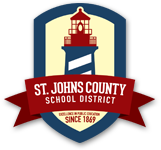High School Course Sequence
For Honors or Advanced Course Placement: Grade “C” or better in previous honors course, grade “A” in the previous standard course with teacher recommendation, SSA Level 4 or 5 but not less than 3 in any area.
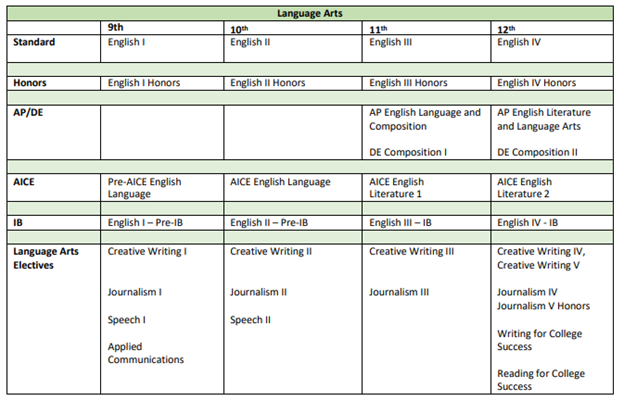
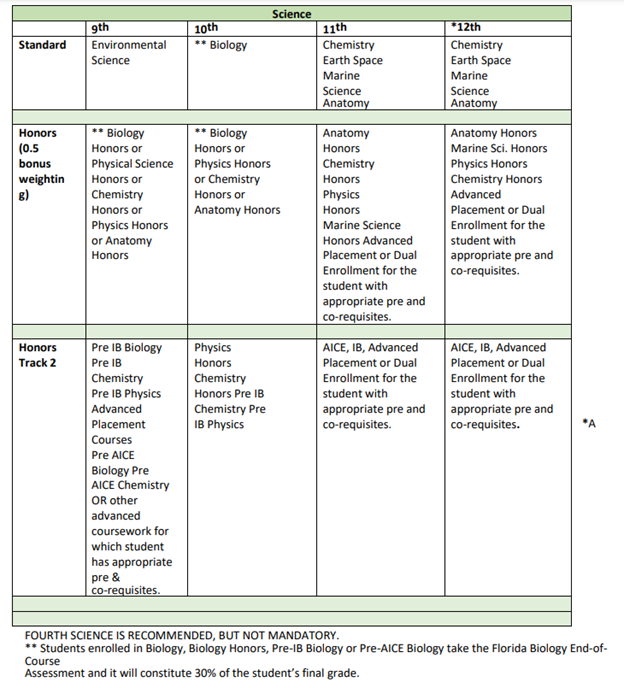
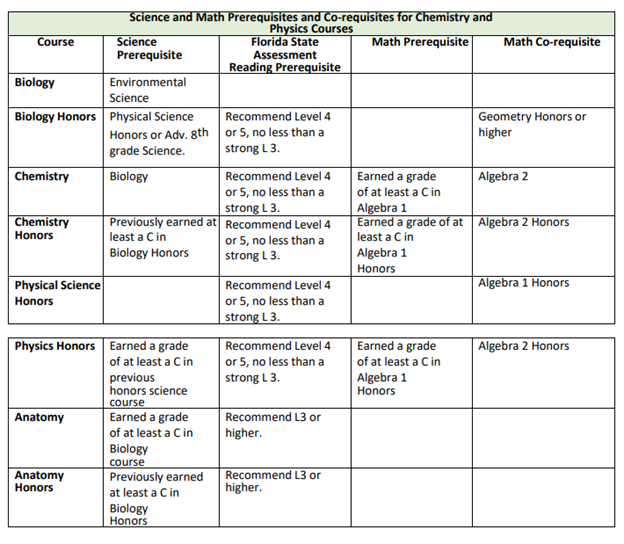
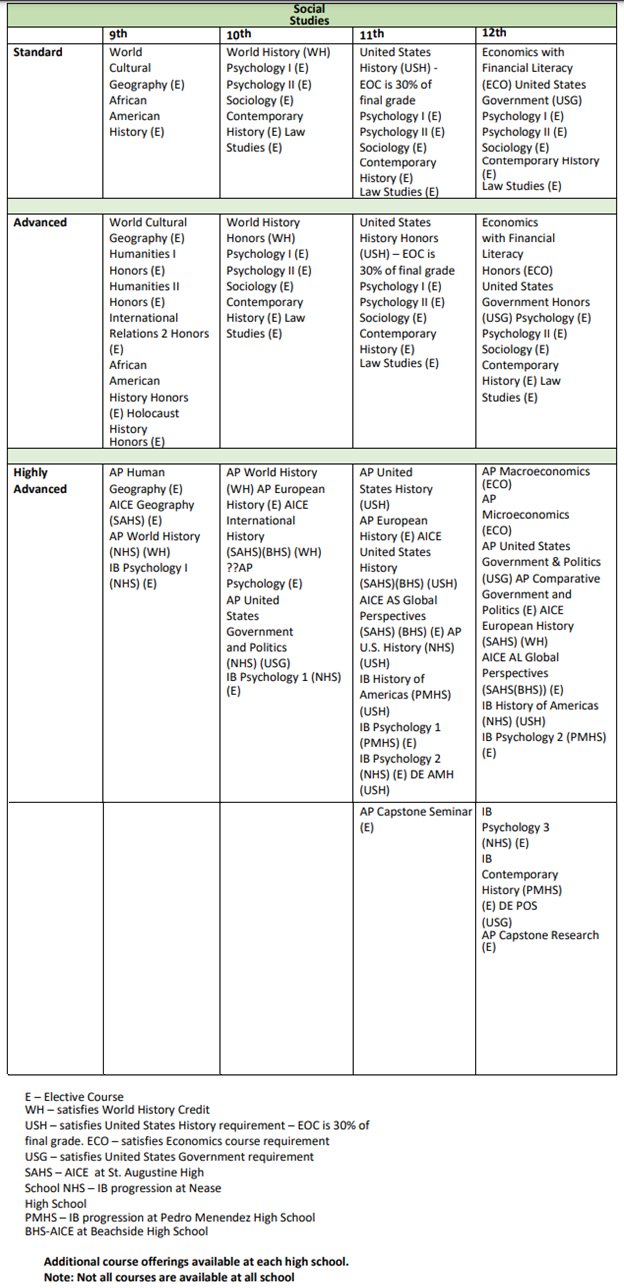
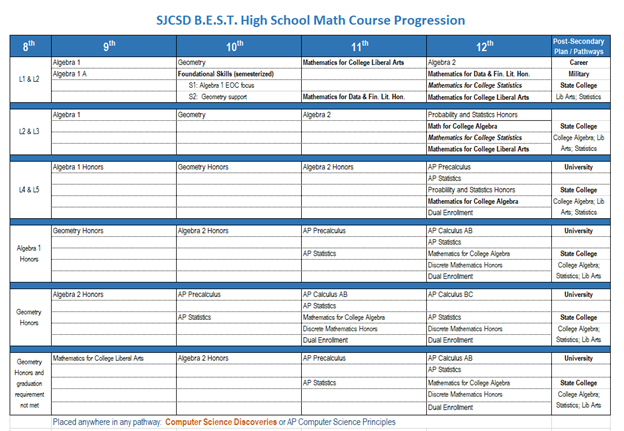
Course Prerequisites and Corequisites
Many courses listed in the St. Johns County Course Catalog have prerequisites and corequisites. These prerequisites and/or corequisites must be honored unless student petition and the ensuing conversation with a school counselors indicate that an exception needs to be made based on data and a student’s Customized Learning Path.
Enrollment in Sequential Courses
Subject-area courses that depend on sequential information are expected to be taken in sequential order. In such courses, a student who fails to pass may not be allowed to enroll in the next higher course level until the failed course has been remediated in an approved program successfully, by retaking the course during the regular school year, in Adult Education or in another traditional or virtual/online school. If a situation of hardship or illness exists which prevents a student from taking a course in sequence, the principal, or designee, may grant an exception.
High School Course Registration
Each spring or upon enrollment, students meet with a school counselor to select courses for the upcoming school year. Course placement is based on a review of pre and/or co-requisite courses, current grades, state assessment scores and teacher recommendations.
Course registration decisions include:
- Review of core courses
- Selection of elective options
- Choice of traditional or virtual model
- Request for a reduced schedule for seniors and juniors
* Possible reasons to reduce a schedule during the junior and/or senior year include:
- Travel time to DE courses on the college campus
- Advanced schedule – full time college is typically 4 or 5 courses per semester
- Employment or internship
- Medical situation
- Graduation requirements can be satisfied and Algebra I EOC and FAST requirements have been met
High School Course Review Process
A Student Request Verification Form is available for review by parents/legal guardian and students in the Home Access Center (HAC) following course registration. Students may request a course change until the last day of school. Changing a course is at the discretion of the school based on student need and availability.
Schedule Correction Request
Once the student schedule is released, students may only request a schedule correction for the following reasons:
- Duplicate course
- Missing a course
- Misplaced/wrong level
Course Level Change
Students enrolled in a yearlong course, may request a course change at the end of the semester, only if all the following conditions have been met:
- grade of D or F
- completion of a parent conference
- demonstration of the student seeking consistent academic assistance
Students enrolled in a half-credit course, may request a course change at the end of the quarter, only if all the following conditions have been met:
- a grade of D or F
- completion of a parent/legal guardian conference
- demonstration of the student seeking consistent academic assistance
Please Note:
- All requests will be honored based on availability
- Placement based on FAST/EOC scores may supersede request
In the case of extenuating circumstances, a petition may be made on a case-by-case basis to the principal (or designee) for review of criteria to ensure proper course placement.
After 21 days, the grade earned in the honors/AP class follows the student to the next course, but teachers have flexibility to adjust the transfer grade based on demonstrated mastery of standards in the new course.
Note-withdrawing from dual enrollment courses is governed by the college deadlines, not school policy.
Student Petitions for Change in Course Placement
If a student believes that he/she has been placed in a course inappropriate for his/her Customized Learning Path (CLP), the student may petition for a course placement review. Course placement reviews will be handled by the Guidance Department at each school. A school counselor will meet with the petitioning student and review evidence of mastery. Together, the school counselor and the student will determine if the recommended course placement is appropriate for the student’s CLP or if the student’s petition for another course will be honored based on data.
Appeal procedure: In the event the student and the school counselor have differing opinions; the petition will be forwarded to the school principal who will decide. If the student still believes his/her placement is inappropriate, the student may meet with the program specialist for the respective subject area who will examine all mastery evidence and advise the student of district policy. However, the principal of the school is the final authority for placement decisions.
Enrollment in Off-Campus Courses
Students are expected to take courses offered on their school campus. If a student’s customized learning path (CLP) indicates the need for the student to take a course at another location in a high school, college or virtual setting, the student must request permission from the principal in writing, citing the need for the course to be taken in an alternate setting. The principal or designee, upon review of the student’s custom CLP, shall grant or deny permission for the student to leave campus.
Colleges must have a signed articulation agreement with the school district for courses to be added to the high school transcript and to be considered dual enrollment. Courses must also be part of a college or university’s general education requirements. Costs for courses taken at an institution that does not have an articulation agreement with the school district or are not part of the general education requirements are incurred by the family and are not eligible to be added to the high school transcript.
Fulltime
Students must be enrolled full time until graduation course work requirements are met. Full time is defined in terms of Full-Time Equivalency – 100% FTE:
- Traditional courses @ SJCSD high school site – 7 classes
- Full time virtual – 6 classes
- Full time dual enrollment – 4 courses
If a student chooses to combine options, the number of courses required for full time status defaults to the highest number of courses.
Students are encouraged to maintain full time status throughout high school to take advantage of all the available opportunities:
- Accelerated courses that may result in college credit (AICE, AP, DE, IB)
- Career and technical education courses that may result in industry certifications
- World language courses to broaden language acquisition and qualify for the biliteracy diploma seal
- Elective courses to continue to develop talents and skills
- Leadership opportunities in clubs, athletics, and academic programs of emphasis.
Part Time
Students may petition the principal of the school to reduce a traditional schedule. Possible reasons to reduce courses during the year include:
- Travel time to DE courses on the college campus
- Advanced schedule – full time college is typically 4 or 5 courses per semester
- Employment or internship
- Medical situation
- Graduation requirements can be satisfied during the senior year without a full schedule if Algebra 1 EOC and FAST requirements have been met.
Consistent with school board rules and in accordance with state statute (1012.28 (5) F.S.), the Superintendent has designated the principal of the school as the final authority in the placement of students in programs or classes.
